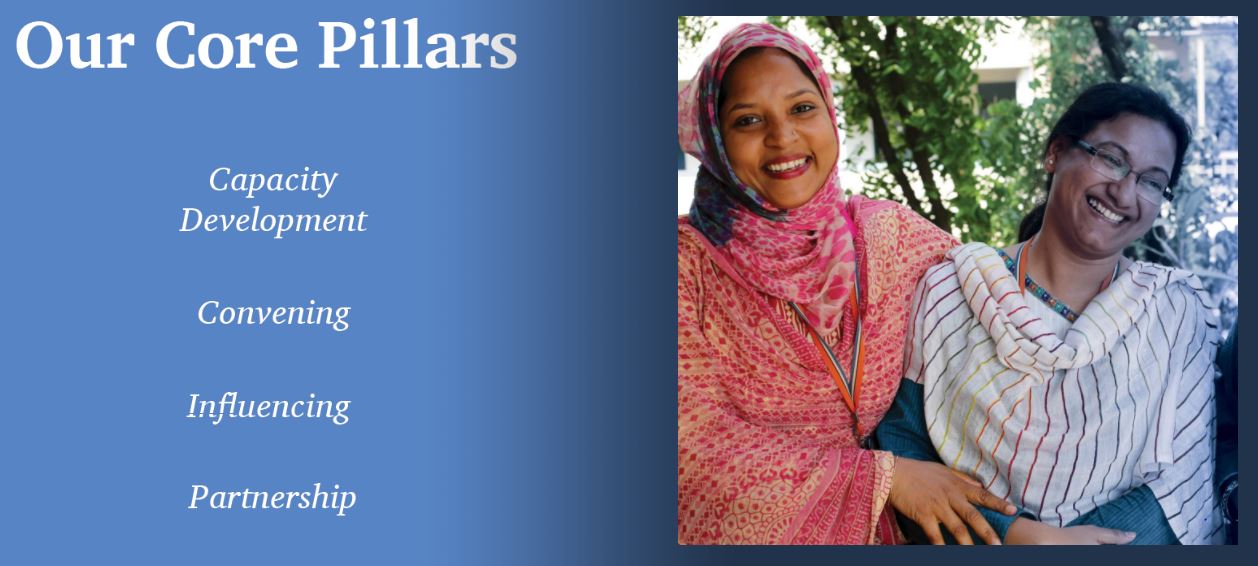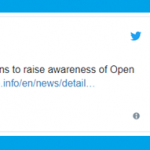
Why INASP’s core pillars matter
As we celebrate our 25th anniversary, we’ve been reflecting on INASP’s core pillars – the approaches that are most important in our work to put research and knowledge at the heart of development. INASP’s core pillars are central to our identity as a catalyst for change.
How do they play out in practice? And what makes these approaches unique? Our staff reflect.
Capacity development
INASP develops local capacity through online learning and blended approaches to training, and by promoting South-to-South knowledge sharing through mentoring and institutional pairing. We have a strong focus on learning and disseminating what works. Sustainability is core to all that we do, and we are working to ensure greater inclusiveness, so that both men and women have equal opportunities to benefit.
AuthorAID is INASP’s free global network providing support, mentoring, resources and training for researchers in low- and middle-income countries; for this programme, capacity development is key:
Jennifer Chapin, Programme Manager, Research and Communication: “Capacity development is integral to the success of AuthorAID. A recent impact study of AuthorAID’s support found that 56% of our participants cited AuthorAID in helping them publish, and 82% reported a positive effect on both their skillset and confidence in writing papers and navigating the publishing process.”
Convening
INASP promotes collaboration and co-creation by bringing together different partners involved in the production and use of knowledge for national development. We are continually improving our capabilities and methodologies, in order to develop more appropriate and responsive approaches that reflect the context in which our partners work.
INASP’s Leading in the Library programme supports university library consortia to improve their organizational effectiveness through capacity development on leadership, strategy and influencing.
 Kemal Shaheen, Programme Manager, Organizational Capacity Development: “The Leading in the Library project works across five countries. Pulling everyone together to get the programme off the ground was pivotal.”
Kemal Shaheen, Programme Manager, Organizational Capacity Development: “The Leading in the Library project works across five countries. Pulling everyone together to get the programme off the ground was pivotal.”
Our work to improve the use of research and knowledge in policy making has seen us work with parliament staff, MPs, researchers and citizens in Ghana, South Africa, Uganda and Zimbabwe:
 Emily Hayter, Programme Manager, Evidence-Informed Policy Making (EIPM): “Convening is absolutely crucial–EIPM is all about meaningful dialogue and co-creation between different actors with different interests and incentives. For me, convening is a way to achieve the other pillars–if you get the right stakeholders together, they can build each others’ capacity, develop partnerships and work together to influence change. Convening can be messy and challenging but it goes to the heart of our work’s success.”
Emily Hayter, Programme Manager, Evidence-Informed Policy Making (EIPM): “Convening is absolutely crucial–EIPM is all about meaningful dialogue and co-creation between different actors with different interests and incentives. For me, convening is a way to achieve the other pillars–if you get the right stakeholders together, they can build each others’ capacity, develop partnerships and work together to influence change. Convening can be messy and challenging but it goes to the heart of our work’s success.”
Influencing
Capacity development needs to be complemented by influencing those who have the power to make change happen, both locally and internationally. Together with our partners, we have the potential and credibility to lead debates in research development and to put forward thinking on a range of issues ranging from the role of women in the research and knowledge system to concerns about the cultural and political implications of the lack of investment in local research.
INASP’s Publishers for Development work focuses on the responsible engagement of academic research publishers with library consortia in low income settings to deliver relevant, reliable research literature. This work has relied on all pillars to achieve its success in influencing publishers to adopt responsible business practices:
 Anne Powell, Programme Manager, Information Access & Publisher Liaison: “Capacity development, in partnership with the library consortia, has resulted in seven consortia which are now running sustainably and independently from INASP. Convening publishers, consortia, researchers and other like-minded individuals allowed all groups to gain understanding of the country context and each other’s role in supporting and strengthening local research. All of these activities resulted in influencing consortia to develop a strategic and business-like mindset and influencing publishers to develop responsible business practices.”
Anne Powell, Programme Manager, Information Access & Publisher Liaison: “Capacity development, in partnership with the library consortia, has resulted in seven consortia which are now running sustainably and independently from INASP. Convening publishers, consortia, researchers and other like-minded individuals allowed all groups to gain understanding of the country context and each other’s role in supporting and strengthening local research. All of these activities resulted in influencing consortia to develop a strategic and business-like mindset and influencing publishers to develop responsible business practices.”
Partnership
Working in partnership is fundamental to INASP’s approach and underlies our capacity development, convening and influencing work. We believe in investing in long-term relationships to build trust and promote ownership amongst local partners through an inclusive, participatory approach.
Jennifer: “We pride ourselves in AuthorAID on having long-term partnerships with universities and research institutes and therefore strong relationships with the people we work with. We also facilitate the creation of networks of support, for example, we link partners who help each other by sharing resources, solutions to challenges, or offering to facilitate sessions. We also connect partners to the wider AuthorAID online platform where they mentor young researchers, or engage with fellow researchers from around the world in the online course or discussion forum. These relationships are key to AuthorAID’s success.”
What is different about INASP?
Our team have worked across the globe in many different institutions, so what do they feel is distinctive about INASP’s approach?
Kemal: “INASP occupies a very niche sector – the intersection between research, knowledge and development.
Emily: “INASP’s approach on working across national research to policy systems with a wide range of research producers and users is particularly unique. I also value our awareness of the power dynamics in the knowledge sector in developing countries.”
Anne: “For me, INASP’s ability to listen and respond is unique and something that has been the foundation for building relationships over time. We have become the trusted partner for both consortia and publishers and are often the ‘go to’ group when advice on tricky situations is sought.”
Together, the pillars allow us to work with multiple partners and across many systems in a niche area: strengthening the capacity of individuals and institutions to produce, share and use research and knowledge in support of national development. Perhaps it is the combination of all four pillars that truly make INASP’s approach unique.


 Previous Post
Previous Post Next Post
Next Post


